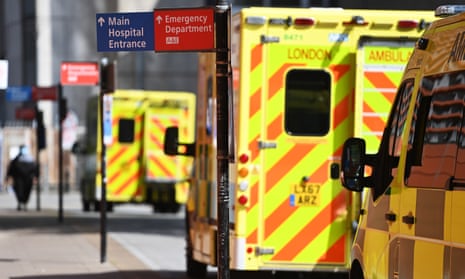Hospitals are battling staff absences, exhaustion, persistent backlogs and problems discharging patients in the wake of the latest wave of Covid, the Guardian has found, as infection levels continue to rise across the UK.
According to the latest data from the Office for National Statistics, an estimated 2.71 million people in the UK had Covid in the last week of June, an 18% rise on the week before. In England alone, the most recent figures suggest about one in 25 people had a Covid infection.
Hospitalisations with Covid are also rising, with data for 30 June revealing there were 11,316 people in hospital with Covid in the UK, up from 8,350 on 23 June. The number of people in hospital primarily due to Covid is also rising, with 3,749 such patients in England as of 5 July, up from 2,877 on the Tuesday before.
Dr David Strain, senior clinical lecturer at the University of Exeter medical school, said he had seen a rise in people coming to hospital because of Covid, with patients displaying respiratory problems or delirium as a result of the infection.
Strain noted the rise in infections had also had knock-on effects, with staff absences due to Covid adding to other workforce problems caused by Brexit, pension disputes and exhaustion.
“We’ve got unprecedented staff sickness,” said Strain. “We’ve still got people off with long Covid from the first three waves [and now] with a very high transmission we are having lots of staff absences [among people] who’ve contracted [Covid] in the current round.”
Strain said changes in policy around testing of patients and mask wearing in hospital had contributed to the challenges of rising infections.
“This wave, which is driven by the highly transmissible BA.4 and BA.5 Omicron sub-variants, started to hit us at exactly the same time that there was a significant government pressure to stop wearing masks in hospital because of the way it appeared. And therefore, for a very brief period, there was a fair amount of in hospital transmission as well,” he said.
One issue raised by Strain is that patients cannot be discharged to care settings if they have Covid, or have been exposed to it. Should an infected visitor enter a ward, he noted, an entire bay of otherwise well patients would not be able to be discharged, meaning their beds become unavailable for new patients.
“We are back to a position where we are having to cancel procedures because patients are in the beds for Covid,” he said.
“We’ve got a population that we haven’t been doing our best for because we’ve been looking after Covid. Just as we were on track to start making up some lost ground, we’re back to waiting lists getting longer instead of getting shorter.”
Dr Naru Narayanan, president of the HCSA – the hospital doctors’ union – said it was extremely concerned about the rise in Covid cases in hospital, adding that it was hearing stories across the country of increasing staff absences due to Covid.
“NHS staff are already under intense pressure amid a workforce crisis and morale is at rock bottom,” he said. “Exhausted staff are stepping up to ensure that patient care does not suffer, but every week is a battle to fill rotas. The wisdom of watering down infection control procedures and removing face masks now looks decidedly lacking.”
Prof Phil Banfield, the BMA council chair, said action was needed and called for a return of mask-wearing for patients, regular NHS staff testing and staff access to high-quality PPE. He said the government had a responsibility to ensure that the public were still well informed about the risks of Covid.
“In the absence of strong public health messaging, we believe it is important that the public exercise a cautious approach at this time, such as wearing masks in enclosed spaces, and take measures to limit their exposure to the virus where possible,” he said. Such actions were not only about alleviating the immediate pressures on the health service, he warned, but also about longer-term impacts.
Banfield called for the government to develop a long-term strategy to deal with the fallout from Covid.“Part of this must include a reversal of their decision to end special enhanced leave for NHS staff absent with long Covid,” he said.
